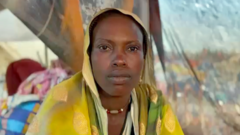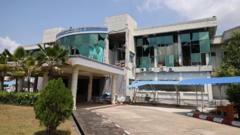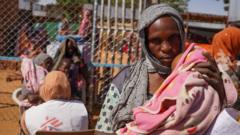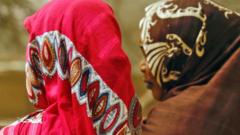In the wake of violent assaults on internally displaced persons in Sudan's Zamzam camp, stories are emerging of harrowing escapes and profound loss as families seek refuge in Tawila.
Escaping Sudan: Trauma and Survival from Zamzam Camp to Tawila

Escaping Sudan: Trauma and Survival from Zamzam Camp to Tawila
Desperate journey of the displaced as armed conflict escalates in Sudan.
Fleeing sweat and tears, Fathiya Mohammed, a 28-year-old mother of two, has become a poignant symbol of the devastating impact of ongoing violence in Sudan. After enduring the nightly terror in Zamzam, once a sanctuary for over 700,000 displaced citizens, Fathiya was forced to escape on foot, carrying her children and worldly possessions in a frantic bid for safety.
For its residents, the Zamzam camp had provided a fragile stability—an opportunity to rebuild lives shattered by decades of conflict in Darfur. However, that hope unraveled dramatically when the paramilitary group Rapid Support Forces (RSF) launched a fierce attack on the camp, leaving it "completely destroyed," according to North Darfur Health Minister Ibrahim Khater.
Fathiya began her perilous journey barefoot, enduring four agonizing days as she made her way to the town of Tawila. She described the torment of not knowing the whereabouts of her husband, who was lost amid the chaos. Along with countless others, she faced additional threats on her journey, including theft and severe exhaustion.
MSF, a medical charity on the ground, reported a mass exodus since the assault, with tens of thousands now arriving in Tawila. Survivors are met with dire conditions at overwhelmed medical facilities. "We see many people injured by bullets; it is becoming routine," shared head nurse Tiphaine Salmon. Heart-wrenching cases have emerged, including a seven-month-old baby suffering from bullet wounds—an echo of the relentless violence faced in Zamzam.
Throughout this turmoil, residents like Saadiya Adam have shared stories of complete devastation, with homes and livestock reduced to ash. "I have nothing left," she lamented, reflecting a common narrative of loss that has swept through the camp.
Eyewitness accounts further highlight the perils faced by evacuees. Issa Abdullah, injured in an RSF attack, recounted how his group was targeted without mercy, and others like Hussein Khamis faced similar fates, with many left behind due to injuries when evacuation was impossible.
As humanitarian organizations like MSF continue to provide relief, the uncertainty looms—many remain missing, and the trauma of what was left behind is a heavy burden.
The RSF’s actions indicate a troubling trajectory as they consolidate power in an increasingly fractured Sudan. With reports of a potential governmental shift in territories under their control, fears are palpable that the conflict might deepen further.
In a moment of reflection, Fathiya Mohammed continues to express a singular wish: "We want the war to stop. Peace is the most important thing." Her voice resonates with a deep yearning for stability amidst chaos, a sentiment echoed by many fleeing the grip of violence in their homeland.
Amidst the relentless waves of conflict, those who have been displaced seek not just refuge, but a return to dignity and the hope of rebuilding their lives.
For its residents, the Zamzam camp had provided a fragile stability—an opportunity to rebuild lives shattered by decades of conflict in Darfur. However, that hope unraveled dramatically when the paramilitary group Rapid Support Forces (RSF) launched a fierce attack on the camp, leaving it "completely destroyed," according to North Darfur Health Minister Ibrahim Khater.
Fathiya began her perilous journey barefoot, enduring four agonizing days as she made her way to the town of Tawila. She described the torment of not knowing the whereabouts of her husband, who was lost amid the chaos. Along with countless others, she faced additional threats on her journey, including theft and severe exhaustion.
MSF, a medical charity on the ground, reported a mass exodus since the assault, with tens of thousands now arriving in Tawila. Survivors are met with dire conditions at overwhelmed medical facilities. "We see many people injured by bullets; it is becoming routine," shared head nurse Tiphaine Salmon. Heart-wrenching cases have emerged, including a seven-month-old baby suffering from bullet wounds—an echo of the relentless violence faced in Zamzam.
Throughout this turmoil, residents like Saadiya Adam have shared stories of complete devastation, with homes and livestock reduced to ash. "I have nothing left," she lamented, reflecting a common narrative of loss that has swept through the camp.
Eyewitness accounts further highlight the perils faced by evacuees. Issa Abdullah, injured in an RSF attack, recounted how his group was targeted without mercy, and others like Hussein Khamis faced similar fates, with many left behind due to injuries when evacuation was impossible.
As humanitarian organizations like MSF continue to provide relief, the uncertainty looms—many remain missing, and the trauma of what was left behind is a heavy burden.
The RSF’s actions indicate a troubling trajectory as they consolidate power in an increasingly fractured Sudan. With reports of a potential governmental shift in territories under their control, fears are palpable that the conflict might deepen further.
In a moment of reflection, Fathiya Mohammed continues to express a singular wish: "We want the war to stop. Peace is the most important thing." Her voice resonates with a deep yearning for stability amidst chaos, a sentiment echoed by many fleeing the grip of violence in their homeland.
Amidst the relentless waves of conflict, those who have been displaced seek not just refuge, but a return to dignity and the hope of rebuilding their lives.

















